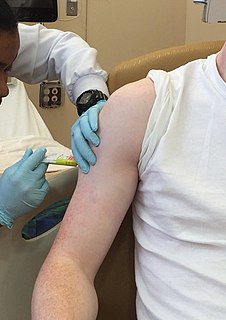Related Research Articles

Clinical trials are prospective biomedical or behavioral research studies on human participants designed to answer specific questions about biomedical or behavioral interventions, including new treatments and known interventions that warrant further study and comparison. Clinical trials generate data on dosage, safety and efficacy. They are conducted only after they have received health authority/ethics committee approval in the country where approval of the therapy is sought. These authorities are responsible for vetting the risk/benefit ratio of the trial—their approval does not mean the therapy is 'safe' or effective, only that the trial may be conducted.

Human subject research is systematic, scientific investigation that can be either interventional or observational and involves human beings as research subjects, commonly known as test subjects. Human subject research can be either medical (clinical) research or non-medical research. Systematic investigation incorporates both the collection and analysis of data in order to answer a specific question. Medical human subject research often involves analysis of biological specimens, epidemiological and behavioral studies and medical chart review studies. On the other hand, human subject research in the social sciences often involves surveys which consist of questions to a particular group of people. Survey methodology includes questionnaires, interviews, and focus groups.

The United States Food and Drug Administration's Investigational New Drug (IND) program is the means by which a pharmaceutical company obtains permission to start human clinical trials and to ship an experimental drug across state lines before a marketing application for the drug has been approved. Regulations are primarily at 21 CFR 312. Similar procedures are followed in the European Union, Japan, and Canada.
An institutional review board (IRB), also known as an independent ethics committee (IEC), ethical review board (ERB), or research ethics board (REB), is a committee that applies research ethics by reviewing the methods proposed for research to ensure that they are ethical. Such boards are formally designated to approve, monitor, and review biomedical and behavioral research involving humans. They often conduct some form of risk-benefit analysis in an attempt to determine whether or not research should be conducted. The purpose of the IRB is to assure that appropriate steps are taken to protect the rights and welfare of humans participating as subjects in a research study. Along with developed countries, many developing countries have established national, regional or local Institutional Review Boards in order to safeguard ethical conduct of research concerning both national and international norms, regulations or codes.
Clinical monitoring is the oversight and administrative efforts that monitor a participant's health and efficacy of the treatment during a clinical trial. Both independent and government-run grant-funding agencies, such as the National Institutes of Health (NIH) and the World Health Organization (WHO), require data and safety monitoring protocols for Phase I and II clinical trials conforming to their standards.
An adverse event (AE) is any untoward medical occurrence in a patient or clinical investigation subject administered a pharmaceutical product and which does not necessarily have a causal relationship with this treatment. An adverse event can therefore be any unfavourable and unintended sign, symptom, or disease temporally associated with the use of a medicinal (investigational) product, whether or not related to the medicinal (investigational) product.
An investigational device exemption (IDE) allows an investigational device to be used in order to collect safety and effectiveness data required to support a premarket approval (PMA) application or a premarket notification [510(k)] submission to Food and Drug Administration (FDA). Clinical studies are most often conducted to support a PMA. Only a small percentage of 510(k)'s require clinical data to support the application. Investigational use also includes clinical evaluation of certain modifications or new intended uses of legally marketed devices. All clinical evaluations of investigational devices, unless exempt, must have an approved IDE before the study is initiated.
Good clinical practice (GCP) is an international quality standard, which governments can then transpose into regulations for clinical trials involving human subjects. GCP follows the International Council for Harmonisation of Technical Requirements for Pharmaceuticals for Human Use (ICH), and enforces tight guidelines on ethical aspects of clinical research.
The Belmont Report is a report created by the National Commission for the Protection of Human Subjects of Biomedical and Behavioral Research. Its full title is the Belmont Report: Ethical Principles and Guidelines for the Protection of Human Subjects of Research, Report of the National Commission for the Protection of Human Subjects of Biomedical and Behavioral Research.
Clinical research is a branch of healthcare science that determines the safety and effectiveness (efficacy) of medications, devices, diagnostic products and treatment regimens intended for human use. These may be used for prevention, treatment, diagnosis or for relieving symptoms of a disease. Clinical research is different from clinical practice. In clinical practice established treatments are used, while in clinical research evidence is collected to establish a treatment.
A case report form is a paper or electronic questionnaire specifically used in clinical trial research. The case report form is the tool used by the sponsor of the clinical trial to collect data from each participating patient. All data on each patient participating in a clinical trial are held and/or documented in the CRF, including adverse events.
In drug development and medical device development the Investigator's Brochure (IB) is a comprehensive document summarizing the body of information about an investigational product obtained during a drug trial. The IB is a document of critical importance throughout the drug development process and is updated with new information as it becomes available. The purpose of the IB is to compile data relevant to studies of the IP in human subjects gathered during preclinical and other clinical trials.

In health care, a clinical trial is a comparison test of a medication or other medical treatment, versus a placebo, other medications or devices, or the standard medical treatment for a patient's condition.
The Office for Human Research Protections (OHRP) is a small office within the United States Department of Health and Human Services (DHHS), specifically the Office of the Assistant Secretary for Health in the Office of the Secretary of DHHS, that deals with ethical oversights in clinical research conducted by the department, mostly through the National Institutes of Health (NIH).
A glossary of terms used in clinical research.
The following outline is provided as an overview of and topical guide to clinical research:
In the clinical research trial industry, loss to follow-up refers to patients who at one point in time were actively participating in a clinical research trial, but have become lost at the point of follow-up in the trial. These patients can become lost for many reasons. Without properly informing the investigator associated with the clinical trial, they may have opted to withdraw from the clinical trial, moved away from the particular study site during the clinical trial, become ill and unable to communicate, are missing or are deceased.
The term informed assent describes the process whereby minors may agree to participate in clinical trials. It is similar to the process of informed consent in adults, however there remains some overlap between the terms.
Various organizations have created guidelines for human subject research for various kinds of research involving human subjects and for various situations.
References
- ↑ "Good Clinical Practice in FDA-Regulated Clinical Trials". www.fda.gov. Archived from the original on 2001-11-24.
- ↑ Ottosen, M. J. (2007). Clinical Research in Clinical Practice, Making it Work for Patients (presentation). The University of Texas Health Science Center at Houston.
- ↑ "Home". ich.org.
- ↑ Fedor, C.A., et al. (2006 Remedica). Responsible Research A Guide for Coordinators. ISBN 1-901346-68-4
- ↑ "Code of Federal Regulations. Title 45. Public Welfare. Department of Health and Human Services. Part 46. Protection of Human Subjects". US Department of Health and Human Services. June 23, 2005. Archived from the original on 2008-12-16.
- ↑ "Indirect Cost Overview". 17 December 2020.